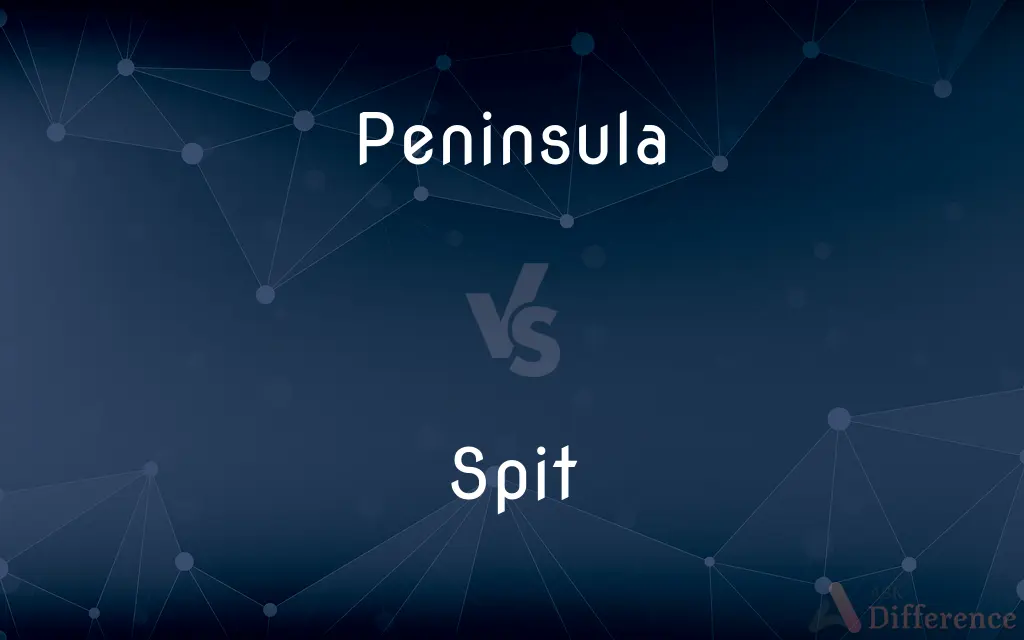Peninsula vs. Spit — What's the Difference?
Edited by Tayyaba Rehman — By Maham Liaqat — Updated on April 14, 2024
A peninsula is a piece of land extending into water and surrounded on three sides by water, typically larger and more prominent. A spit, however, is a narrow stretch of land extending into a body of water from the coast, formed by sediment deposition.

Difference Between Peninsula and Spit
Table of Contents
ADVERTISEMENT
Key Differences
Peninsulas are significant landforms that project into bodies of water, such as seas, lakes, or oceans, and are connected to a larger landmass by an isthmus. They can be large enough to contain towns, cities, or even entire countries. On the other hand, spits are comparatively smaller, narrower formations of sand or gravel that extend from the coast into the water, primarily formed by the longshore drift of sediments.
Geologically, peninsulas are often the result of tectonic forces or the erosion of land, creating a broad feature that significantly influences the geography and climate of an area. Spits, whereas, are dynamic and somewhat temporary features that can change shape with storms and currents, showing the ongoing process of sediment accumulation and erosion.
In terms of habitat, peninsulas often have a diverse ecological system due to their larger size and varied geography. They may support a wide range of flora and fauna. Spits, on the other hand, are usually less diverse but can provide critical habitats for specific wildlife, including birds and marine life, particularly in their lagoon or marsh areas.
Access and human use also differ significantly between these two. Peninsulas may have well-developed infrastructure and are significant for strategic, residential, or economic purposes. Spits, however, are often more isolated and less developed, though they are popular for certain activities like bird watching, fishing, and recreational walking.
While both landforms play crucial roles in coastal dynamics, their impact on human settlement, navigation, and environmental conservation can vary greatly. Peninsulas might be central to cultural and historical development of a region, whereas spits often play a role in natural processes and serve as indicators of environmental changes.
ADVERTISEMENT
Comparison Chart
Definition
Land surrounded by water on three sides, connected to a larger landmass
Narrow land extending into water, formed by sediment deposition
Size and Scope
Larger, can contain cities or countries
Smaller, more elongated and narrow
Formation
Result of tectonic activities or erosion
Result of sediment deposition by longshore drift
Ecological Diversity
Typically high, supports varied habitats
Lower, but important for specific species
Human Use
Often heavily populated and developed
Less developed, used for recreation and conservation
Compare with Definitions
Peninsula
A landform surrounded by water on three sides, connected to mainland.
The Florida Peninsula is known for its warm climate.
Spit
A narrow land extension into water, formed by sediment.
Spit Long Point protects the bay by curbing waves.
Peninsula
Often large and containing significant populations.
The Italian peninsula has played a crucial role in European history.
Spit
Dynamic and sensitive to environmental changes.
The local spit changes shape with each significant storm.
Peninsula
Can be formed by tectonic forces or erosion.
The Scandinavian Peninsula was shaped by glacial erosion.
Spit
Important for wildlife, especially birds.
The spit's marshes are crucial for migrating bird species.
Peninsula
Supports diverse ecological systems.
The Arabian Peninsula is home to unique desert wildlife.
Spit
Typically formed by longshore drift.
The sandy spit at the river mouth continues to grow each year.
Peninsula
Strategic for residential and economic activities.
The Korean Peninsula is vital for trade in East Asia.
Spit
Popular for specific recreational activities.
The narrow spit is a favorite spot for local fishermen.
Peninsula
A portion of land nearly surrounded by water, and connected with a larger body by a neck, or isthmus.
Spit
A narrow point of land extending into a body of water.
Peninsula
A peninsula (Latin: paeninsula from paene 'almost' and insula 'island') is a landform surrounded by water on most of its border while being connected to a mainland from which it extends. The surrounding water is usually understood to be continuous, though not necessarily named as a single body of water.
Spit
A generally low, narrow, pointed, usually sandy peninsula.
Peninsula
A piece of land almost surrounded by water or projecting out into a body of water.
Spit
Saliva, especially when expectorated; spittle.
Peninsula
A piece of land that juts out from a larger land mass and is mostly surrounded by water.
Spit
The act of expectorating.
Peninsula
(geography) A piece of land projecting into water from a larger land mass.
Spit
Something, such as the frothy secretion of spittle bugs, that resembles spit.
Peninsula
A large mass of land projecting into a body of water
Spit
A brief, scattered rainfall or snowfall.
Spit
(Informal) The perfect likeness
He's the spit and image of his father.
Spit
A slender, pointed rod on which meat is impaled for roasting.
Spit
To eject from the mouth
Spat out the grape seeds.
Spit
To eject as if from the mouth
A fire spitting sparks.
Spit
To emit suddenly and forcefully
Spat out an insult.
Spit
To eject matter from the mouth; expectorate.
Spit
To express contempt or animosity, especially by ejecting matter from the mouth.
Spit
To make a hissing or sputtering noise
French fries spitting in the pan.
Spit
To rain or snow in light, scattered drops or flakes.
Spit
To impale on or as if on a spit.
Spit
A thin metal or wooden rod on which meat is skewered for cooking, often over a fire.
Spit
(uncountable) Saliva, especially when expectorated.
There was spit all over the washbasin.
Spit
(countable) An instance of spitting; specifically, a light fall of rain or snow.
Spit
A person who exactly resembles someone else (usually in set phrases; see spitting image).
Spit
(uncountable) slam
Spit
The depth to which the blade of a spade goes into the soil when it is used for digging; a layer of soil of the depth of a spade's blade.
Spit
The amount of soil that a spade holds; a spadeful.
Spit
(transitive) To impale on a spit; to pierce with a sharp object.
To spit a loin of veal
Spit
(transitive) To use a spit to cook; to attend to food that is cooking on a spit.
She’s spitting the roast in the kitchen.
Spit
(ambitransitive) To evacuate (saliva or another substance) from the mouth, etc.
Spit
(ambitransitive) To emit or expel in a manner similar to evacuating saliva from the mouth.
A hot pan spitting droplets of fat
Spit
(impersonal) To rain or snow slightly.
Spit
(ambitransitive) To utter (something) violently.
Spit
(intransitive) To make a spitting sound, like an angry cat.
Spit
To rap, to utter.
Spit
(in the form spitting) To spit facts; to tell the truth.
He's spitting for sure.
Spit
To dig (something) using a spade; also, to turn (the soil) using a plough.
Spit
To plant (something) using a spade.
Spit
To dig, to spade.
Spit
A long, slender, pointed rod, usually of iron, for holding meat while roasting.
Spit
A small point of land running into the sea, or a long, narrow shoal extending from the shore into the sea; as, a spit of sand.
Spit
The depth to which a spade goes in digging; a spade; a spadeful.
Spit
The secretion formed by the glands of the mouth; spitle; saliva; sputum.
Spit
To thrust a spit through; to fix upon a spit; hence, to thrust through or impale; as, to spit a loin of veal.
Spit
To spade; to dig.
Spit
To attend to a spit; to use a spit.
She's spitting in the kitchen.
Spit
To eject from the mouth; to throw out, as saliva or other matter, from the mouth.
Spit
To eject; to throw out; to belch.
Spit
To throw out saliva from the mouth.
Spit
To rain or snow slightly, or with sprinkles.
It had been spitting with rain.
Spit
A narrow strip of land that juts out into the sea
Spit
A clear liquid secreted into the mouth by the salivary glands and mucous glands of the mouth; moistens the mouth and starts the digestion of starches
Spit
A skewer for holding meat over a fire
Spit
The act of spitting (forcefully expelling saliva)
Spit
Expel or eject (saliva or phlegm or sputum) from the mouth;
The father of the victim spat at the alleged murderer
Spit
Utter with anger or contempt
Spit
Rain gently;
It has only sprinkled, but the roads are slick
Spit
Drive a skewer through;
Skewer the meat for the BBQ
Common Curiosities
What is a spit?
A spit is a narrow piece of land extending into a body of water, formed from sedimentation.
What is a peninsula?
A peninsula is a significant landmass surrounded by water on three sides and connected to a larger landmass.
Why are peninsulas important for human settlement?
Peninsulas often offer strategic advantages for trade, defense, and settlement, surrounded by water yet connected to the mainland.
Are spits permanent landforms?
No, spits are subject to change due to environmental factors like storms and currents and can be quite dynamic.
How do peninsulas and spits differ in formation?
Peninsulas are often formed by tectonic forces or erosion, while spits are formed by sediment deposition.
How do spits impact coastal environments?
Spits can protect coastlines from erosion, create lagoons, and support diverse marine ecosystems.
What role do peninsulas play in regional climates?
Peninsulas can significantly affect local climates, often moderating temperatures due to their large water boundaries.
What types of wildlife benefit from spits?
Coastal and marine birds, as well as certain fish and plant species, often thrive in the habitats created by spits.
Can a spit become a peninsula?
Typically no, as spits are much smaller and formed differently, though they are both coastal landforms.
What are the ecological implications of a peninsula compared to a spit?
Peninsulas support a broader range of habitats and species due to their size, while spits provide specific, often crucial habitats for certain wildlife.
How might climate change impact peninsulas and spits?
Rising sea levels and increased storm activity could lead to significant changes in both landforms, potentially altering their size and shape.
What recreational activities are common on spits?
Activities like bird watching, walking, and fishing are popular on spits due to their natural environment and scenic views.
How do human activities affect spits and peninsulas differently?
Human activities can lead to significant ecological impacts on both, but peninsulas are more likely to be developed and urbanized.
Can the formation of a spit influence nearby human communities?
Yes, the formation of a spit can affect local navigation, fishing, and provide protection against coastal erosion.
What geological processes contribute to the growth of a spit?
Longshore drift and the deposition of sediments are key processes in the formation and growth of spits.
Share Your Discovery

Previous Comparison
Endoscopy vs. Arthroscopy
Next Comparison
Guava vs. MangoAuthor Spotlight
Written by
Maham LiaqatEdited by
Tayyaba RehmanTayyaba Rehman is a distinguished writer, currently serving as a primary contributor to askdifference.com. As a researcher in semantics and etymology, Tayyaba's passion for the complexity of languages and their distinctions has found a perfect home on the platform. Tayyaba delves into the intricacies of language, distinguishing between commonly confused words and phrases, thereby providing clarity for readers worldwide.














































